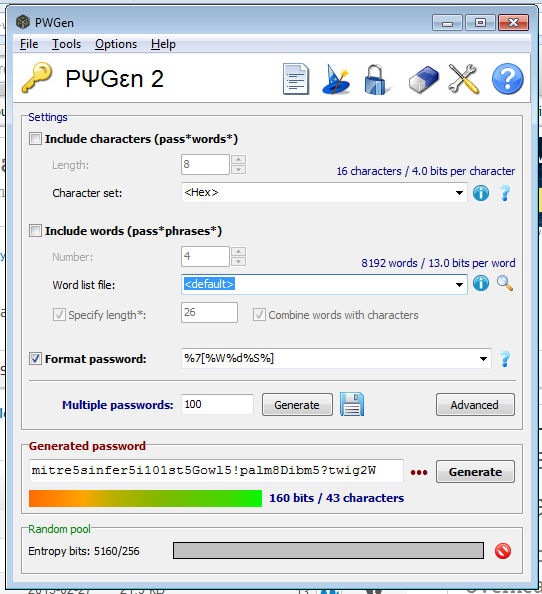

shorter than hex encoded (32 and 64 instead of 22 and 44) solutions such as md5sum/sha1sum, etc.Ĭredit to and especially the comments for my initial inspiration.the output can be easily selected and pasted or printed and retyped with minimal human error rates.22 and 44 characters pair quite nicely (just above even) common power of two breakpoints.doesn't "waste" much randomness (uses 89% of the random bits it receives vs ~24% for solutions directly piping to tr).it uses standard system tools - no extra binaries.the command is simple to type and memorable.22 characters gives me: log 2(57 22) > 128.32 bits of entropy.Generate 7 passwords (user names) of length 13: gpw 7 13 Three-letter combinations (trigraphs) taken from whatever dictionaries you This package generates pronounceable passwords. To generate random user names you can use gpw: generate more secure, completely random but hard to remember passwords): pwgen -s 13 7ĮAfycrPlM4cYv 4MRXmZmyIVNBp D8y71iqjG7Zq7 FQRHcserl4R8O yRCUtPtV3dsqV Generate 7 passwords of length 13: pwgen 13 7Įu7Teadiphaec giepahl3Oyaiy iecoo9Aetaib4 phaiChae6Eivi athoo3igee8CoĪs mentioned in the comments, you can avoid reducing entropy by using the -s argument (i.e. Remembering their position when memorizing only the word. Uppercase letters and digits are placed in a way that eases These passwords contain either only lowercase letters, or upperĪnd lower case mixed, or digits thrown in. Pwgen generates random, meaningless but pronounceable passwords.
COMMANDES PWGEN PASSWORD
y, –symbols = Include at least one special character in the password.To generate a random password you can use pwgen: It provides less secure passwords to allow system administrators to not have to worry with random passwords accidentally contain offensive substrings. v, –no-vowels = Generate random passwords that do not contain vowels or numbers that might be mistaken for vowels. These should only be used for machine passwords, since otherwise it’s almost guaranteed that users will simply write the password on a piece of paper taped to the monitor… s, –secure = Generate completely random, hard-to-memorize passwords. Also, note that the name of the file may be easily available from the ~/.history or ~/.bash_history file. If you use this option, make sure the attacker can not obtain a copy of the file. The passwords generated using this option are not very random. ie: pwgen -H gives a list of possibles passwords for your pop3 account, and you can ask this list again and again. It will allow you to compute the same password later, if you remember the file, seed, and pwgen’s options used.

H, –sha1=/path/to/file = Will use the sha1′s hash of given file and the optional seed to create password.

This is the default if the standard output is a tty device. n, –numerals = Include at least one number in the password. This defaults to a screenful if passwords are printed by columns, and one password. N, –num-passwords=num = Generate num passwords. C = Print the generated passwords in columns. c, –capitalize = Include at least one capital letter in the password. It may be useful for users who have bad vision, but in general use of this option is not recommended. This reduces the number of possible passwords significantly, and as such reduces the quality of the passwords. B, –ambiguous = Don’t use characters that could be confused by the user when printed, such as ‘l’ and ’1′, or ’0′ or ‘O’. a, –alt-phonics = This option doesn’t do anything special it is present only for backwards compatibility. A, –no-capitalize = Don’t bother to include any capital letters in the generated passwords. 1 = Print the generated passwords one per line. 0, –no-numerals = Don’t include numbers in the generated passwords. For example, to get a 12-character password, use pwgen 12, and the utility will spit out a set of 120 possible passwords from which to choose (six columns, 20 rows). The default should be fine for most users. It uses a random pool to gather entropy from user inputs and system parameters as well as text encryption.
COMMANDES PWGEN GENERATOR
Pwgen – PWGen is a password generator capable of creating large amounts of cryptographically secure random passwords or passphrases (from word lists).


 0 kommentar(er)
0 kommentar(er)
